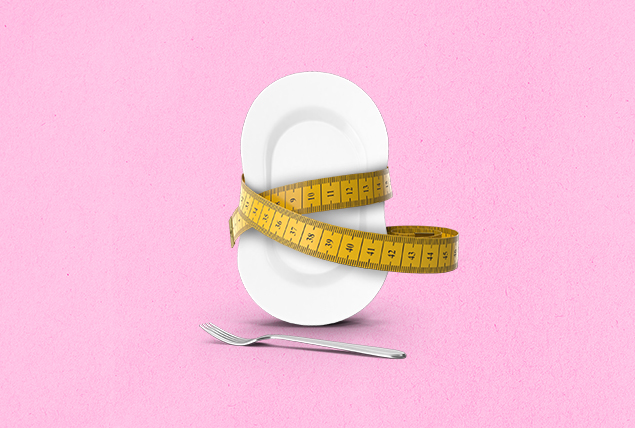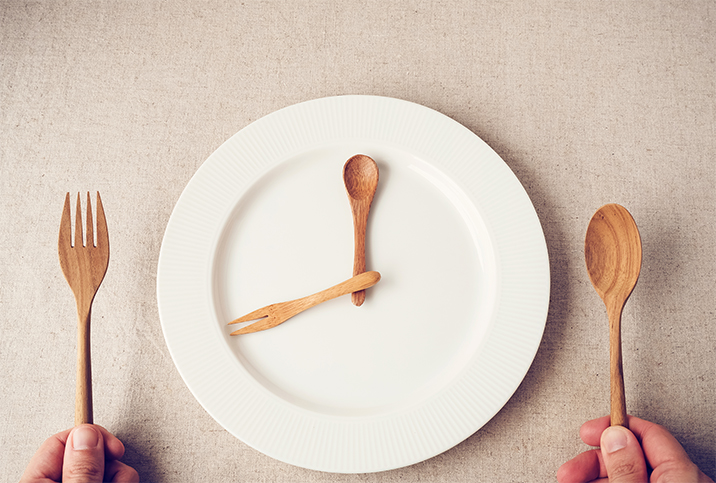The Problem With Intermittent Fasting

Many diets almost require a spreadsheet to track what you can and cannot eat. That level of intensity can make eating out with friends and family nearly impossible. Then intermittent fasting arrived on the scene and had only one rule to follow: Don't eat anything for 12 to 16 hours.
Is this diet too good to be true? Let's take a look.
The potential downsides of intermittent fasting
"I do intermittent fasting, so there's no food in the morning. I noticed a big difference in going without solid food for 16 hours," actor Jennifer Aniston told RadioTimes.com in 2019. Much like the Rachel haircut fad of the 1990s, people were now lured by Aniston's and other celebrities' claims of easily getting into shape.
But intermittent fasting may not be the best diet choice for some people. This dieting approach can be triggering to people who have struggled with eating disorders.
This diet can even lead to disordered eating tendencies, such as ignoring innate hunger when you're not supposed to eat or overeating when it is mealtime, warned Sarah Schlichter, M.P.H., R.D.N., a registered dietitian based in Frederick, Maryland.
"If someone is undereating overall, which is very possible with less eating instances, it can lead to nutrient deficiencies, hormonal imbalances, such as cortisol, insulin and thyroid dysregulations, and electrolyte imbalances," Schlichter said.
Fluctuations in bodily function
Intermittent fasting can worsen your symptoms if you struggle with a hormone imbalance or polycystic ovary syndrome (PCOS). Going too long without eating can be stressful to the body, causing a drop in blood sugar which spikes adrenaline hormones such as cortisol, our stress hormone, Schlichter explained.
"Research has suggested that cortisol is already dysregulated in PCOS, primarily through increased hypothalamic-pituitary-adrenal axis activity and enhanced cortisol secretion. Increased cortisol could potentially lead to elevated adrenal and androgen production in PCOS," Schlichter said.
Accidental overindulgence
The vague rule of intermittent fasting can contribute to unintentional weight gain. Since intermittent fasting's only rule is to eat at certain times and doesn't distinguish what you can and cannot eat, people often go for high-calorie and not nutrient-dense foods, which can lead to weight gain, Schlichter explained.
"Since people are trying to fit all of their calories into less eating instances, it can promote overeating and eating until discomfort," Schlichter added. "Due to the reduced frequency of eating, some people may feel more sluggish and fatigued, leading to greater caffeine intake—which may spike blood sugar/cortisol levels, and cortisol promotes fat storage—or less exercise and movement."
Loss of muscle definition
Some people may find it easy to lose muscle and gain fat while they try to follow intermittent fasting's loose guidelines. They may overeat during the consumption window.
"On the flip side, if you're not eating enough, skipping meals during your eating window or not getting adequate protein, you may gain fat and lose muscle," explained Florence Comite, M.D., founder of the Comite Center for Precision Medicine & Health in New York City.
Other possible risks of intermittent fasting
Some other risks and downsides of this eating style, which typically occur during fasting, include headaches, fatigue, mood irregularities, medication interactions, dehydration, nausea, dizziness and blood sugar "crashes," said Mahmud Kara, M.D., founder of KaraMD in Cleveland.
Intermittent fasting isn't for people younger than 18, anyone who is pregnant or trying to conceive, or anyone who has a history of eating disorders. People with ongoing health issues, such as diabetes, may want to consult a healthcare professional before making dietary changes.
It's important when you decide to fast intermittently that you develop healthy habits that work for your specific lifestyle and can be maintained, Kara added.
Does intermittent fasting work long term?
This diet can be hard to follow for long.
"It's tough to stick with intermittent fasting forever. My motto is, 'If you can't do it forever, don't do it.' Intermittent fasting can be a recipe for more yo-yo dieting if you're not careful," said Ashlee Wright, R.D., a dietitian with Orlando Health in Florida.
Intermittent fasting may be especially tricky for women to maintain for extended periods. By removing one meal, this diet creates a sizable reduction in your daily calorie count. It could be hard for some people to meet the daily recommended nutrients.
But that's not all. It could stress your body out, too.
"Heightened levels of cortisol also affect sleep. Sleep is the time you release many important hormones which are needed for optimal health. It also affects thyroid function, your master gland for optimal metabolism and mood," said Lyn-Genet Recitas, N.M.T., H.H.P., a sports nutritionist based in New York City.
Not getting enough calories may help you lose weight, but it could also lead to upswings in the primary stress hormone, cortisol, and cause a decrease in your overall bodily wellness.
What are the drawbacks of morning fasting?
Hold the cereal, bakery muffin or bowl of oatmeal. To meet the fasting guidelines, this diet recommends substituting a cup of black coffee for your typical breakfast.
"Drinking black coffee only on an empty stomach may lead to uncomfortable symptoms like nausea, dizziness, sweating, fatigue or headaches due to the lack of food," Kara said.
This morning routine has the potential to cause unpleasant side effects.
"Black coffee is a mess," Recitas cautioned. "The acidity greatly affects digestion—acid reflux, GERD, etcetera—and tricking your body into not eating will raise cortisol levels."
What is a healthy way to start your day?
There's been a lot of debate on what's the healthiest way to start your day. Everyone has a different idea. Some applaud fresh, organic celery juice, while others tout the benefits of a warm cup of lemon water.
But what do licensed doctors and nutritionists believe is a beneficial breakfast?
"During our six to eight hours of rest, we lose water through sweat, urine and the general metabolism process, but water can help jump-start the mind and, in turn, help improve your mental performance throughout the day," Kara said.
You've likely heard of the benefits of staying hydrated.
"By hydrating properly, you may see a noticeable difference in your digestion, skin health and weight-loss efforts, among other health benefits," Kara added.
The bottom line
Any dietary changes should go through a healthcare professional to help you weigh the pros and cons.
"Always talk to your doctor first," Wright suggested. "If you have any medical issues, take medications or have anything that may require medical attention, it's even more important to keep your PCP in the loop."
"Everyone is different, and each of us responds in unique ways to fasting," Comite added. "Fasting might work for one person but make another person unable to think clearly. Intermittent fasting is not always good for you, and claims that IF helps you lose weight is not a universal truth. It doesn't work for everyone."
Speak with your doctor to decide if intermittent fasting is right for you. If you are searching for a new healthcare professional, Giddy Telehealth offers a handy online portal that provides easy access to hundreds of healthcare professionals in an assortment of specialties.


















